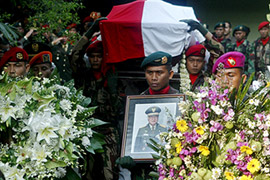Lasting legacy of Suharto
Remnants of bloody rule echo throughout Indonesian archipelago.
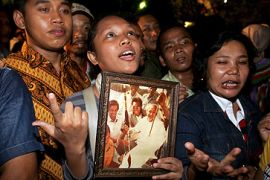
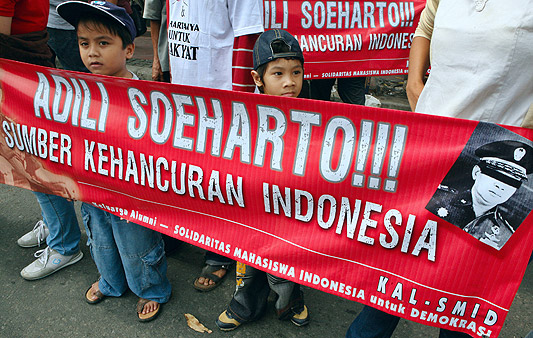 |
| No-one has been held accountable for the 1.5 million who died under Suharto’s rule [AFP] |
As Indonesia marks the death of its former president, survivors of Suharto’s military backed government – from East Timor to Aceh and the Javanese countryside – have sparked a debate about whether the former leader should be forgiven.
The five-star former general, who died on Sunday afternoon, took over Indonesia in 1966, exploiting an alleged coup to purge Indonesia of the world’s largest communist party outside China and sideline Indonesia’s first president Sukarno.
Between half a million to a million people were killed as the army organised Muslim groups and ordinary citizens to take their revenge on the Indonesian Communist party.
Hundreds of thousands of others were jailed, killed or simply disappeared as Suharto cracked down on opponents and stamped Indonesia‘s rule on territories as far apart as Aceh in the west to Timor and Papua in the east.
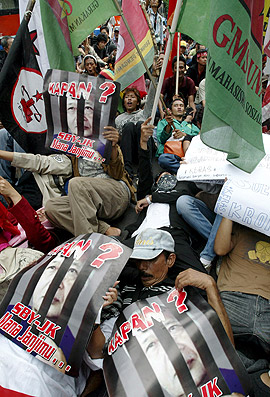 |
|
Rights advocates continue to demand justice |
With the blood of as many as one and a half million people on his hands, and allegedly billions of dollars of state funds in his bank accounts, the wily former dictator has never faced court or had to account for his actions.
As Suharto lingered close to death over the past three weeks, many prominent figures and several political parties started calling for Suharto to be officially pardoned over the lingering corruption charges.
After initially announcing it was willing to make an out of court settlement with Suharto’s family, the government has since said it will not drop corruption charges against the former dictator for embezzling $1.5bn from state foundations.
Amien Rais, the former speaker of parliament who was one of the first politicians to call for Suharto to step down in 1998, has led the call for an official pardon.
Rais argued that the former president’s legacy of massive economic, industrial and social development outweighed the negative influences of his rule.
But not all who felt the rough edge of his power, are so forgiving.
“I don’t agree with a pardon. What Suharto did was unforgivable and unforgettable,” said Yusuf Isaak, a former journalist who was detained for 10 years for allegedly being a communist.
Other former political prisoners say that while they might privately forgive Suharto, he should not be forgiven or pardoned by the state.
“What he did was a serious human rights crime, so he should be tried,” said Adyasman Sadgo Prawiro, who spent 14 years in jail for heading the left-leaning national Forestry Workers Union.
“But privately, if he were to admit he was wrong, we could accept it.”
Prawiro leads a group demanding that ex-communists be given an official apology and given compensation for the abuses against them.
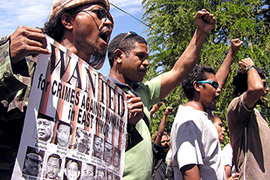 |
| Many in East Timor were disappointed that Suharto escaped prosecution [EPA] |
He says there are 20 million Indonesians alive today, the children, grandchildren and brothers and sisters of the jailed communists, who endured decades of discrimination.
They were turned away from jobs, were not allowed to become civil servants, to join the police force or the military, and were rejected from state universities.
In the now independent nation of East Timor, the trauma of Suharto’s rule is deeply ingrained on the national psyche.
But East Timor’s recently-elected president has called on his people to forgive Suharto for the 1975 invasion, and for the almost 180,000 people who died as result of the 24 years of Indonesian occupation.
“Today we are free, we have survived, we got our independence, and so we should not be hostage, no matter how tragic it was, to the past,” Jose Ramos Horta told Al Jazeera.
Horta, who lost three brothers and a sister during the military operation and was jointly awarded the Nobel peace prize in 1996, says he knows from personal experience how hard it is to forget the brutality of the operation.
“I’m not speaking academically, every time we, my mother and I see their face in photos, we all feel incredibly sad,” he said.
| Related | ||||||
|
Putting Suharto, or the generals under him, on trial would “undermine this young democracy”, said Horta.
But Jose Luis, from rights group Sahe, says many East Timorese were disappointed that Suharto and his generals escaped prosecution for the invasion and subsequent military campaign.
“Not just the Timor case, buy various cases such as Aceh. He should have been put on trial so that this could never be repeated and to protect Indonesia‘s future,” said Luis, speaking from Dili.
Under pressure from the United Nations, Indonesia held a much-criticised human rights trial, charging military, police and militia commanders for their role in the violence that swept East Timor in the wake of the 1999 independence vote.
However, despite the deaths of up to 1,500 people, all except a militia leader were found innocent while not a single official has faced trial for all the atrocities committed prior to 1999.
At the other end of the archipelago, in Aceh, where an estimated 20,000 people died during multiple military operations against the separatist Free Aceh Movement, anger at Suharto is still palpable.
Aceh has largely been peaceful since the signing of a landmark peace deal in 2005 – an agreement prompted by the massive loss of life caused by the Asian tsunami.
But former rebel leaders such as Teungku Nasiruddin, who was jailed and spent a year in solitary confinement after the collapse of an earlier peace deal, says Suharto should answer for his crimes.
“Maybe privately he can be forgiven, but the legal process has to run its course, and he should be put on trial for what he did here,” said Nasiruddin.
Whilst perpetrators of the Rwandan genocide, the waves of “ethnic cleansing” in the former Yugoslavia, the Nazis and Saddam Hussein have all had to answer for their crimes, the smiling former general has escaped this infamy.
|
|
| Southeast Asia’s longest-serving leader was buried with full state honours [EPA] |
Even the Khmer Rouge in Cambodia now faces a watered down war crimes tribunal for the killing of an estimated two million of its own people.
If Suharto had not been fighting communism, engaged in the Cold war geo-political struggle of his era, there would have been much greater pressure from the West to put Suharto and his generals on trial, say observers.
“Suharto really got lucky,” says Galuh Wandita, from the International Centre for Transitional Justice.
“First of all there was the cold war, and then there was terrorism.”
Although Suharto had already resigned by the time of the 9/11 attacks, Indonesia was courted by the West as an ally in the war on terror, particularly after a series of domestic terror attacks.
The US renewed military assistance which had been dropped in reaction to the East Timor violence and Australia resumed military training of Indonesia‘s elite Kopassus troops.
Suharto’s former political party, Golkar, and the military have remained powerful players in today’s government, ensuring that Suharto and his generals evaded justice, points out Wandita.
Suharto’s successors, Yusuf Habibie and Abdurruhman Wahid both promised to prosecute the numerous human rights violations perpetrated during his rule.
But with a corrupt judiciary, and the military opposed to being held accountable for their actions, these attempts ground to a halt.
Only one case, a massacre at a Muslim boarding school in west Aceh, was ever brought to trial. A soldier was sentenced but he later disappeared, under mysterious circumstances.
And the murder of a supreme court judge by Suharto’s youngest son, Hutomo “Tommy” Mandala Putra, for finding him guilty of corruption, served as a cautionary tale about the limits of prosecuting the Suharto family.
Tommy was given a 15-year sentence, but has since been released after serving just six years of his sentence.



